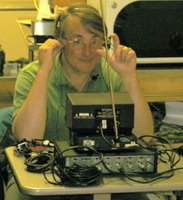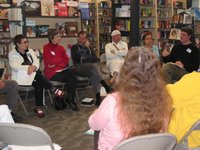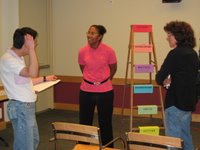The SparkIn April I read about Redwood City Reads in the San Jose Mercury News. It was the first I heard of the “city reads” concept, though I’ve since learned of many more. What attracted me was the variety of activities – discussions, film, and community get-togethers – targeted at people of different ages and cultures. A day later I had an idea for how we could do this in Mountain View with the book
Blink.
Through my work since 1999 as a volunteer mediator with the
City of Mountain View's Mediation Services, I’ve become more knowledgeable about and involved with the city. Mike Ralston, a fellow mediator, had recently formed a nonprofit volunteer organization,
ParadigmHill Mountain View (PHMV), dedicated to promoting local activities and interactions that reflect the mix of MV residents. I approached both Mike and the library with the idea of the project.
In May when PHMV-member Ellen Wheeler, a stranger to me then, stated interest in the project and called for immediate action, we were off! Ellen and I thought that simply implementing the “city reads” concept was important, and we decided this would be the first of an ongoing, annual program. We knew we could do something even with no or little money.
Why Blink?Blink touches on many topics that allowed for citywide conversation and a wide variety of activities, including decision making, first impressions, and stereotypes. Mr. Gladwell’s talk at Books Inc. in 2005 was well attended and there were a lot of questions and discussion. The book is available in multiple languages and formats, including scanned text (important for the visually or reading impaired). Also, the way the book was written (“chunky” topics vs. a long, ongoing story) allowed for reading aloud.
We thought “city reads” could work even if the author couldn’t speak, which turned out to be the case because of Mr. Gladwell’s work and travel schedule. East-West Bookstore and PHMV tried to find authors related to
Blink, but we were unable to schedule any.
What’s Next?Mountain View was ready for such a community effort, proved by the 19 different activities that are being offered this year with over 15 organizations involved. We hope this illustrates what
Mountain View Reads Together can be. We weren’t able to invite all the organizations we would eventually like to have involved because we have already taken on a lot for our first time.
We would like this to be an annual event, with even more involvement from the entire community. If you can even volunteer this year, please contact us! We hope that people will suggest books for future years. We hope organizations will offer suggestions for ways they can be involved; every book will offer different opportunities. We hope, via one book, the sense of community and connection grows even larger within Mountain View.
-- Sharlene Gee





















